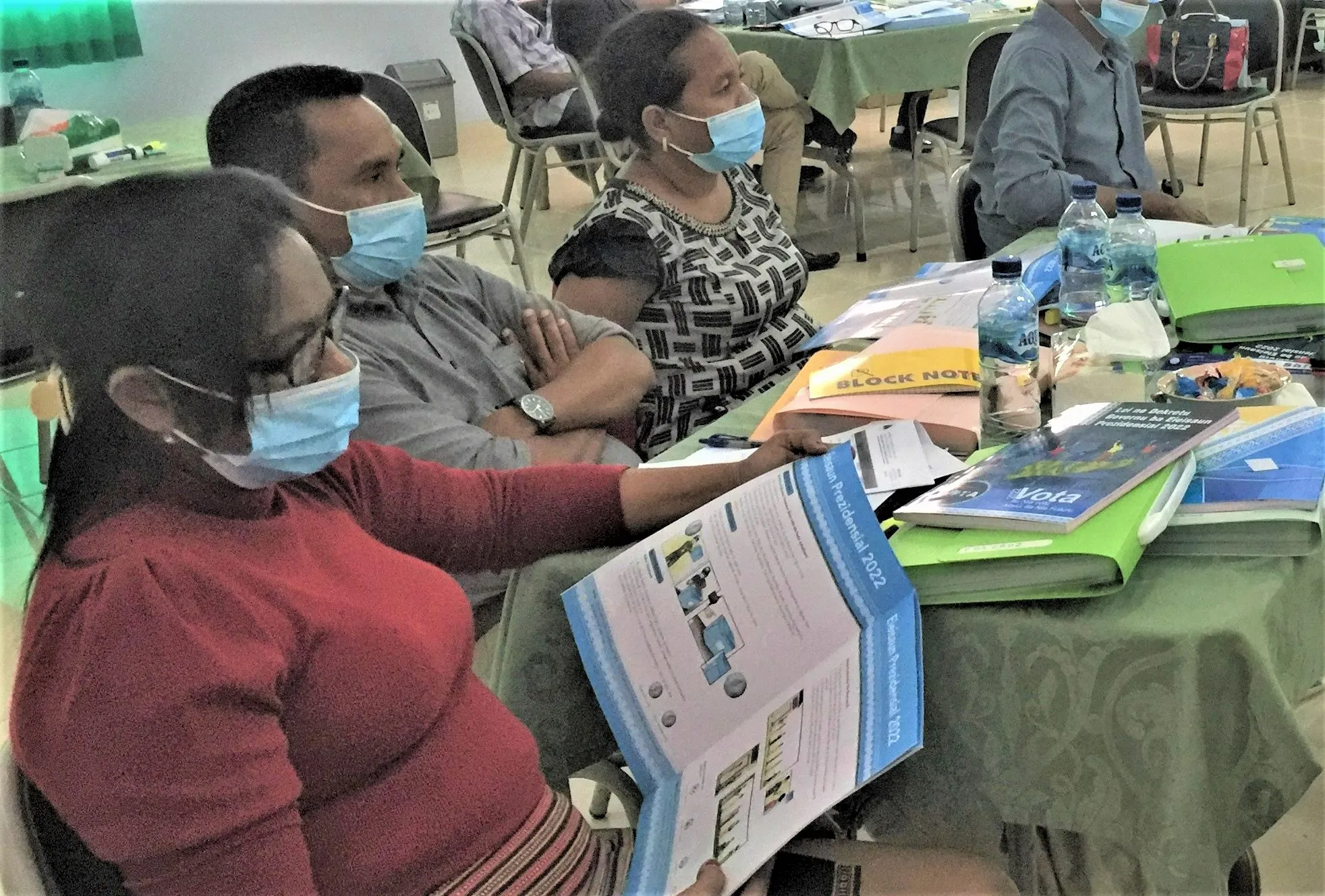From the National to the Local Level: Training election officials across Timor-Leste’s municipalities

After months of anticipation, on 16 January the presidential election in Timor-Leste was called for 19 March 2022. Electors will choose between 16 candidates—four women and twelve men—running for the post of President. Should no candidate receive a majority, the country will see a run-off one month later on 19 April.
In the lead up to the election, the country’s two election management bodies (EMBs)—the Technical Secretariat for Electoral Administration (STAE) and the National Commission on Elections (CNE)—have worked to prepare the procedures for the election. A key part of this preparation is ensuring that these procedures are translated into manuals and trainings to guarantee that Municipal Directors and polling station staff are equipped with the materials and knowledge needed to administer credible elections.
Timor-Leste has 12 municipalities and one Special Administrative Region (SAR) which are responsible for the administration of the sub-districts and villages in their territory. The municipalities and SAR also play a key role in the election, as they are responsible for training electoral officers at the local level and for administering the election, including the identification of polling stations and centers, the recruitment of polling station officers, election day procedures and the counting and tabulation of votes at the sub-national level.
Over the past nine months, International IDEA has worked closely with Timor-Leste’s EMBs to support Covid-resilient, participatory and credible elections and the work of the national and local level election administrators. International IDEA’s support has included recommendations to safeguard the election from Covid-19, the provision of ongoing technical support to the electoral process, and the design and implementation of a comprehensive Training of Trainers (ToT), which was run from 31 January to 3 February 2022 in partnership with the STAE.
The ‘National level Training of Trainers for Election Operations’ was held in person in Dili for 42 participants, including Municipal Directors and Voter Education and Training Officers (two from each municipality) and STAE staff who will be deployed to support cascade training at the local level. Under the project “Covid-Resilient Elections in Timor-Leste”, implemented in partnership with the United Nations Development Programme (UNDP), STAE and CNE and funded by the Governments of Japan and Timor-Leste, International IDEA developed the training curriculum, organized the trainings and facilitated the ToT in partnership with four STAE facilitators.
Through a participatory adult learning methodology, participants learned about election operations, polling center management, electoral crimes and preventing fraud, measures to ensure Covid-resilient elections, and the roles and responsibilities of polling officials, observers, security forces and the media. The project produced and showed a 13 minute film to help polling officials visualize election day and the needed Covid-resilient measures.
Trained participants have now been deployed back to their municipalities, and since 21 February been conducting cascade training along with support staff from the national level STAE. Participants at the local level will include 1,200 ‘brigadas’ (Polling Center Presidents) who will then train the 15,000 polling officials deployed across the country. In order to ensure a good understanding of the electoral process across multiple stakeholders, and thereby enhance its credibility, training sessions on electoral procedures and operations will also be held for political party and candidate agents, police officers, and observer groups. International IDEA will continue to support facilitation at the local level and will be present in two municipalities ahead of the country-wide completion of trainings by 9 March. International IDEA will then complete an evaluation of the efficacy of the training both while the training is happening at each level, and through a series of voter focus groups from across the country soon after election day.
In addition to providing support to the Training of Trainers and its country-wide implementation, International IDEA is continuing its technical support to the CNE and STAE in the lead up to the election.



